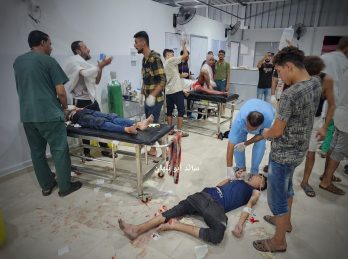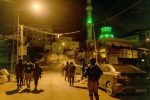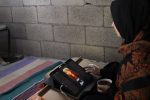GAZA, (PIC)
Khalil Jamal (33 years old) is trying to secure his tent on the beach of Deir al-Balah after strong winds have battered the Gaza Strip for a week. Jamal explains that the cold, harsh winds have torn the fabric of the tent he set up to shelter his family after they were forced to flee from areas in Rafah six months ago.
He adds that he is attempting to stabilize the tent with whatever wood and cloth he can find, hoping his children will feel some warmth at night, as the winds blow in an unusually cold manner, unlike the typical weather the displaced residents of the region have experienced in previous years.
Jamal notes that the weather in Gaza around this time is usually mild and autumn-like, with cool breezes, but not as harsh as the current winds. He emphasizes that if the winds continue to blow strongly at night, his efforts to fix the tent to suit the weather may fail.
He wonders about his situation and that of nearly two million displaced people as winter approaches, especially since their tattered tents failed the first tests of harsh weather. He appeals to the free world for immediate intervention to stop the tragedy, curb the Israeli occupation, and end the ongoing genocide that has lasted for over a year.
According to UN reports, around two million Palestinians left their homes due to forced evacuation orders a year ago, while government media states that the occupation has destroyed a quarter of a million housing units, rendering them uninhabitable.
The situation is not any better in the tent of citizen Mohammed Abu Hilal (44 years old), who set it up across from Al-Aqsa University in Khan Yunis after the Israeli occupation army swept through the city and destroyed his home, along with thousands of others in the southern Gaza Strip.
Abu Hilal says that his nylon tent was recently damaged by strong winds, having already deteriorated from the summer heat. He adds that he is trying to make simple repairs, but buying strong nylon or tarpaulin costs between 350 to 650 shekels.
The father of five explains that the price of a new cover for the tent, which would insulate against water and cold, is expensive given the daily struggle to secure food and clean water for drinking and cooking, as well as firewood.
Abu Hilal describes the suffering of the displaced as indescribable; everyone is bewildered and does not know what to do or where to turn. “We are in crisis over everything—food, sleep, clothing, and blankets. Life is miserable and complicated, and we have no choice but to be patient.”
He anticipates the arrival of winter in a month, confirming that he cannot sleep at night due to this issue, with a single question repeating in his mind: “How will I protect my children from the cold and heavy rains?” He hopes the war will end before then.
The lack of winter clothing is another dilemma facing the families of Jamal and Abu Hilal, both of whom were displaced without being able to take any clothes for their children, like many other displaced people.
When wandering through the markets, it’s nearly impossible to find any winter clothes; if available, they are priced beyond the reach of any Palestinian under these dire circumstances, according to Abu Hilal.
The Government Media Office (GMO) reports that 100,000 out of 135,000 tents for the displaced have become unusable due to wear and tear. The Office previously stated that these tents, made of wood, nylon, and fabric, have deteriorated due to sun exposure and climatic conditions in Gaza, becoming completely non-functional, especially after nearly a year of displacement and the accompanying inhumane conditions.
The GMO has confirmed in several official statements that the Israeli occupation has prevented the entry of thousands of tents into the Gaza Strip amid this grim reality.
Citizen Muath Abu Mustafa, who lives in his tent by the beach in Gaza City, says he is completely helpless against the severe cold gripping the area. “We can’t bear the cold, and we can’t sleep at night due to a lack of clothing and blankets, and the tents are worn out, allowing the wind to seep in on our children. We also need to replace the tarps before they flood due to rain.”
He adds, “When we were displaced, we couldn’t carry anything with us—our home is now rubble.” He continues, “Moreover, blankets and clothing are not available in the markets, and if they are, the prices are astronomical, and we don’t have the money to buy them.”
The people of Gaza face immense challenges, having to adapt to inhumane conditions imposed by the Israeli occupation for over a year, all while facing a harsh winter that exacerbates their ongoing suffering.
With U.S. support, Israel has been carrying out a campaign of genocide in Gaza since October 7, 2023, resulting in over 142,000 dead and injured, more than 10,000 missing, amidst massive destruction and famine that has claimed the lives of many citizens mostly children and the elderly.














